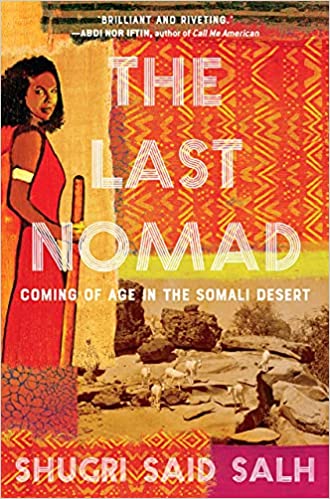Not Rating (see last full paragraph)
Synopsis
A remarkable and inspiring true story that “stuns with raw beauty” about one woman’s resilience, her courageous journey to America, and her family’s lost way of life.
Born in Somalia, a spare daughter in a large family, Shugri Said Salh was sent at age six to live with her nomadic grandmother in the desert. The last of her family to learn this once-common way of life, Salh found herself chasing warthogs, climbing termite hills, herding goats, and moving constantly in search of water and grazing lands with her nomadic family. For Salh, though the desert was a harsh place threatened by drought, predators, and enemy clans, it also held beauty, innovation, centuries of tradition, and a way for a young Sufi girl to learn courage and independence from a fearless group of relatives. Salh grew to love the freedom of roaming with her animals and the powerful feeling of community found in nomadic rituals and the oral storytelling of her ancestors.
As she came of age, though, both she and her beloved Somalia were forced to confront change, violence, and instability. Salh writes with engaging frankness and a fierce feminism of trying to break free of the patriarchal beliefs of her culture, of her forced female genital mutilation, of the loss of her mother, and of her growing need for independence. Taken from the desert by her strict father and then displaced along with millions of others by the Somali Civil War, Salh fled first to a refugee camp on the Kenyan border and ultimately to North America to learn yet another way of life.
Readers will fall in love with Salh on the page as she tells her inspiring story about leaving Africa, learning English, finding love, and embracing a new horizon for herself and her family. Honest and tender, The Last Nomad is a riveting coming-of-age story of resilience, survival, and the shifting definitions of home.
Review
The Last Nomad: Coming of Age in the Somali Desert is an enlightening memoir about Shugri’s nomadic life and is told in a style that replicates the Somali way of oral storytelling. It is fascinating and opens up a door into a lifestyle and culture that isn’t often featured in our mainstream literature.
This book shows the stunning resilience of the nomadic women and is also part startling revelation of the life that Shugri and the women around her experienced. There’s many tense or heavy moments but they are crucial to the story at large. There’s a reckoning here of the life that Shugri’s known and the values she has been taught in comparison with her budding feminist ideals. Though there’s some pretty tough storylines in here (made all the more horrifying by the fact that they’re from someone’s actual life), there’s also amazing hope and strength in this novel. The fact that Shugri’s even here writing this story is a testament to the person that she is.
Although I was fascinated by the author’s life, I might not be in the right headspace for a novel such as this one right now. The jarring storytelling style didn’t fully pull me in as much as I would have liked. That isn’t to say that it’s not a gorgeous book; it very much is. I think this will rank highly for many people and I think I will appreciate it even more on a reread at a time I’m able to enjoy reading about heavier subjects! It is always hard to rank memoirs because who am I to put a value on a person’s life story. Shugri’s life is full of so many trials and triumphs that it is truly an amazing tale. Full disclosure, something about my pregnancy brain at the moment is making reading tough tales hard –when I usually devour stuff like this!
Thanks to Algonquin books for the review copy and for inviting me on this book tour!





Leave a Reply